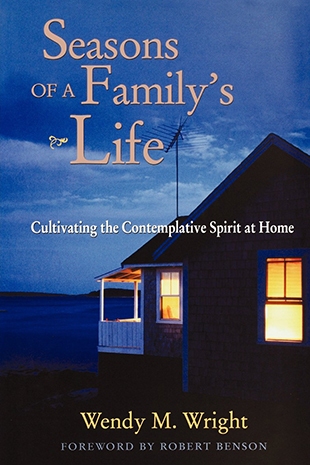Thirteen years ago, Wendy M. Wright, a professor of theology who holds the John C. Kenefick Chair in Humanities at Creighton University, wrote Sacred Dwelling: A Spirituality of Family Life. As a practicing Roman Catholic who is deeply involved in both ecumenical formation and interfaith dialogue, she is convinced that there is a "very real need for a perspective that links the language of family and the spiritual life that is not simply crisis management, self-help, pop psychology, or a conservative agenda packaged in biblical allusions." She recommends "works on family spirituality that are rooted in an appreciation of the deep and wise spiritual traditions to which we are heir . . . works that do not confuse the spiritual life with techniques for tension reduction or with leisure time activity but instead probe human experience in family and challenge readers to wrestle with the great religious questions." This book addresses those needs.
Wright, the mother of three young-adult grown children, ponders the lessons of parenting and how her family life has been enriched by moments of silence and contemplation. Although the hyper-fast pace of modern life works against these two spiritual arts, Wright believes that it is possible to practice the presence of God within the household even as Brother Lawrence did in his kitchen amidst the pots and pans. The family is also the ideal place to practice forgiveness since those living in proximity to us are always challenging us to become more patient and empathetic with their flaws and foibles.
Paying attention, states the author, is "the fundamental art of the spiritual life." A chapter on the role it plays in discernment is especially cogent. She notes that discernment is not the same as problem solving. The discrimination it calls for is not a matter of comparing pros and cons of a particular choice. She offers a poetic analogy: "It is more like the turning of the sunflower to the sun" and continues with this definition: "Discernment is about feeling texture, assessing weight, watching the plumb line, listening for overtones, searching for shards, feeling the quickening, surrendering to love. It is being grasped in the Spirit's arms and led in the rhythms of an unknown dance."
Wright sees consumerism as an obstacle to the development of family solidarity. When the commercial narrative takes over the psyches of husbands, wives, and children; there is little time left for cultivating silence or exploring the sacred places in our lives. Wright includes a wonderful quotation from Peter Maurin who worked with Dorothy Day at the Catholic Worker:
"The world would be better off
if people tried to become better,
and people would become better
if they stopped trying to become better off.
For when everyone tries to become
better off
nobody is better off.
But when everyone tries to become better
everyone is better off."
Wright concludes that the home is the perfect milieu for nurturing the open and loving heart. Here wonder and reverence can be practiced as we cherish the marvels of life and the mysteries of those closest to us in the family circle.
